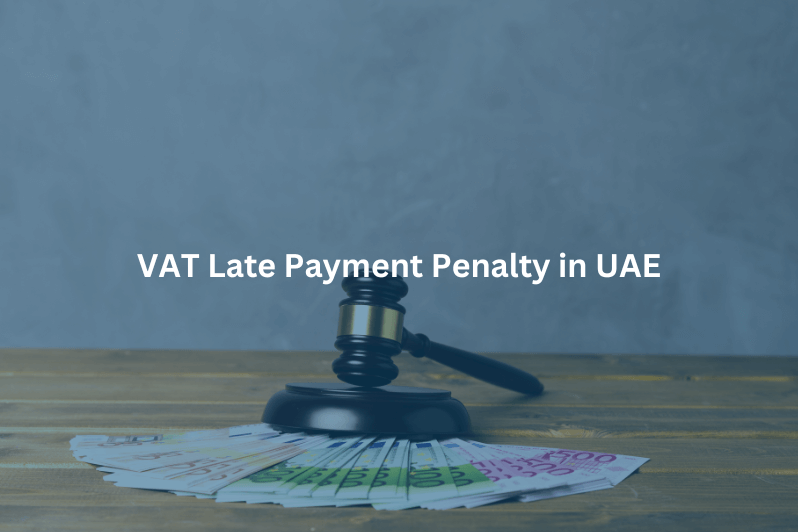Value Added Tax (VAT) was implemented in the United Arab Emirates (UAE), which represented a substantial change in the country's financial policies. The introduction of the consumption tax has resulted in some new laws and compliance requirements for businesses operating in the UAE. The VAT late payment penalty is one of the most important aspects that businesses must be aware of to meet the taxation requirements.
VAT Late Payment Penalties
The Federal Tax Authority (FTA) in the UAE is in charge of VAT-related concerns. To improve compliance and prevent tax evasion, the FTA has established clear rules for VAT late payment penalties. The following are the essential points that business owners should be aware of:
Failure to Register for Value Added Tax
VAT registration is one of the most important criteria for businesses in the UAE. This registration must take place within 30 days after exceeding the Federal Tax Authority's required criteria. Failure to register on time may result in a significant AED 10,000 penalty. This emphasizes the significance of being careful in keeping a record of a business's revenue and commencing the registration process as soon as possible.
Failure to File for Value Added Tax on Time
Businesses must submit their VAT returns no later than the 28th day of the applicable tax period to comply with UAE tax rules. At the end of each tax period, every taxable entity in the UAE is required to file their VAT returns to the Federal Tax Authority. Failure to comply with this provision results in a fine of AED 1,000. Furthermore, repeated offenses within 24 months will result in a more severe penalty of AED 2,000. This emphasizes the importance of keeping a precise record of registration deadlines.
Failure to Maintain Accurate Records
A crucial component of VAT compliance in the UAE is accurate record-keeping. Businesses must maintain accurate financial records and supporting documents. These records are essential in the case that the Federal Tax Authority conducts an audit. Failure to present the relevant documentation may result in VAT fines and penalties of up to AED 10,000 for the first offense. The penalty increases to AED 20,000 for repeated violations.
Failure to Display VAT Inclusive Rates
According to certain conditions, products and services must be priced inclusive of VAT under the Value Added Tax legislation in the United Arab Emirates. Failure to comply with this obligation can result in AED 5,000 in VAT fines and penalties. To prevent such fines, businesses need to make sure that their pricing accurately reflects the inclusive nature of VAT.
Failure to Issue a Tax Credit Invoice
One of the most important steps in the VAT procedure is the issue of a legitimate tax invoice, also known as a tax credit note. The provider must provide this paperwork to the client, who is in charge of paying the VAT. The VAT fines and penalties for not following this procedure are AED 2,500 for each inaccurate document. To ensure compliance, businesses must pay close attention to this step.
Read more: VAT Filing in the UAE
How to Avoid VAT Late Payment Penalties
Business owners in the UAE should adhere to the following recommended practices to prevent VAT late payment penalties:
- Maintain Accurate Records: By maintaining accurate records and being diligent in your VAT calculations, you can avoid unnecessary financial burdens and maintain compliance with tax regulations.
- Set Reminders: By staying informed about your VAT deadlines and maintaining accurate records, you can ensure a smooth and hassle-free taxation process.
- Use Accounting Software: By using accounting software, businesses can save time and effort by automatically calculating VAT amounts and generating accurate VAT reports. This not only reduces the risk of errors but also ensures compliance with tax regulations.
- Monitor Changes in Regulations: By staying informed, you can keep up with the latest industry trends and changes, giving the business a competitive edge. It also helps you identify potential risks and take proactive measures to mitigate them. By staying ahead of the curve, you can make informed decisions that align with market demands and regulations, ensuring the long-term success and sustainability of your business.
- Allocate Sufficient Resources: By properly allocating financial resources and investing in the training of human resources, a company can effectively manage its VAT obligations and maintain a strong financial standing. By prioritizing and allocating these resources effectively, your business can maintain a smooth and efficient VAT compliance process, minimizing any potential risks or penalties.
- Seek Professional Assistance: Hiring Tax Consultant Dubai can help ensure that your business remains compliant and avoids any penalties or legal issues related to late payments. They provide guidance and assistance in understanding the requirements and obligations related to VAT.
Read More: Documents Required for VAT Return Filing in the UAE
